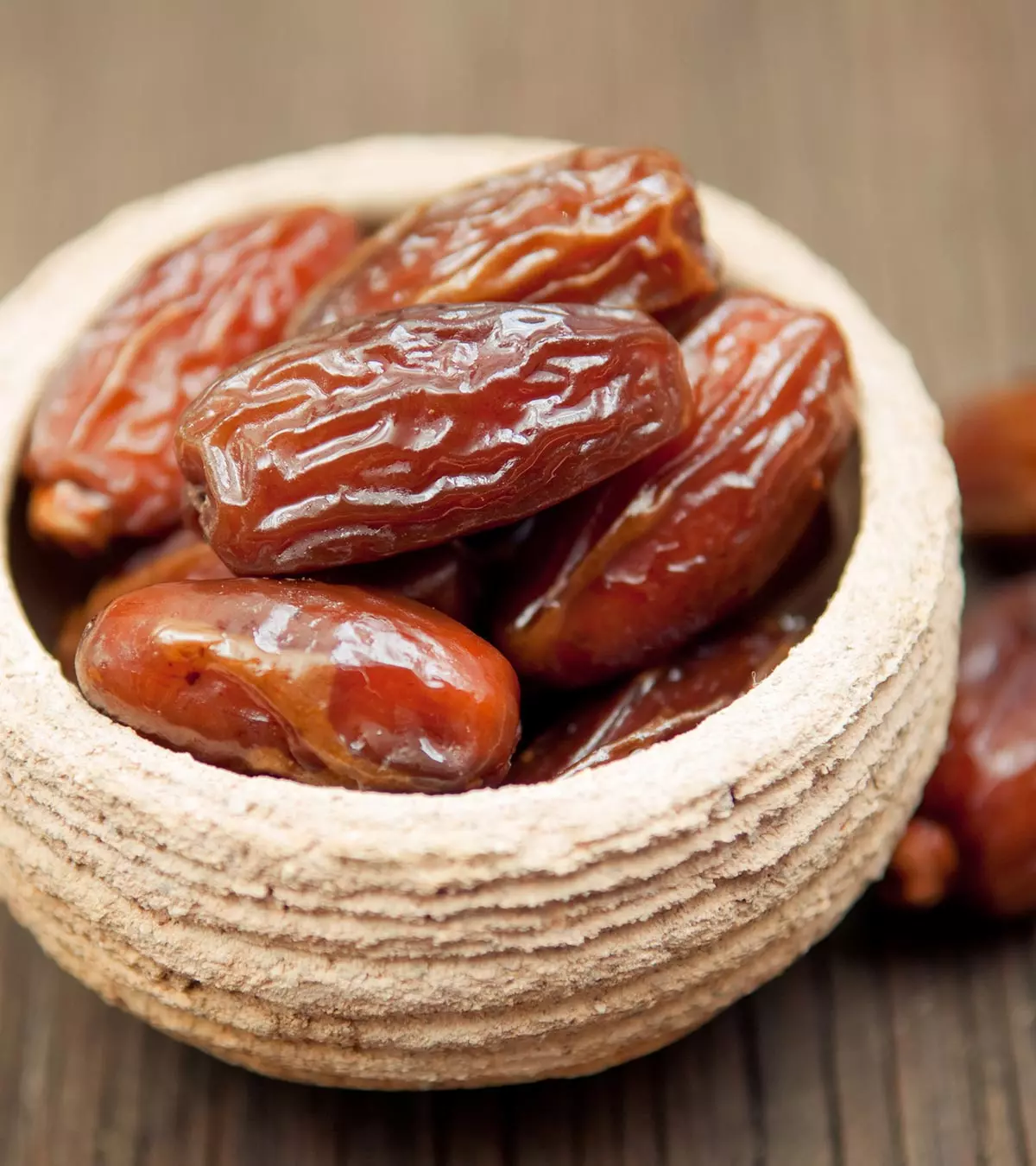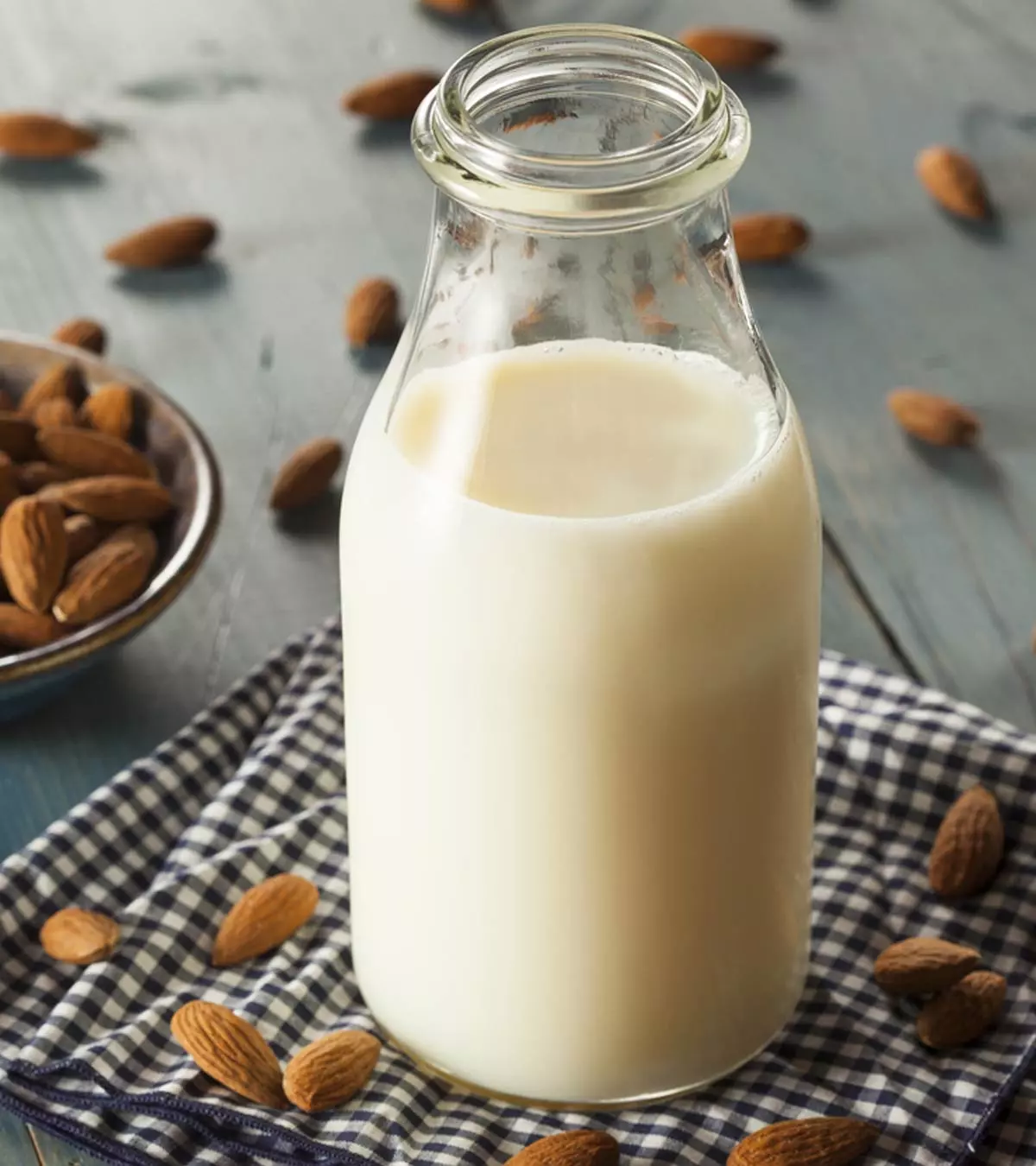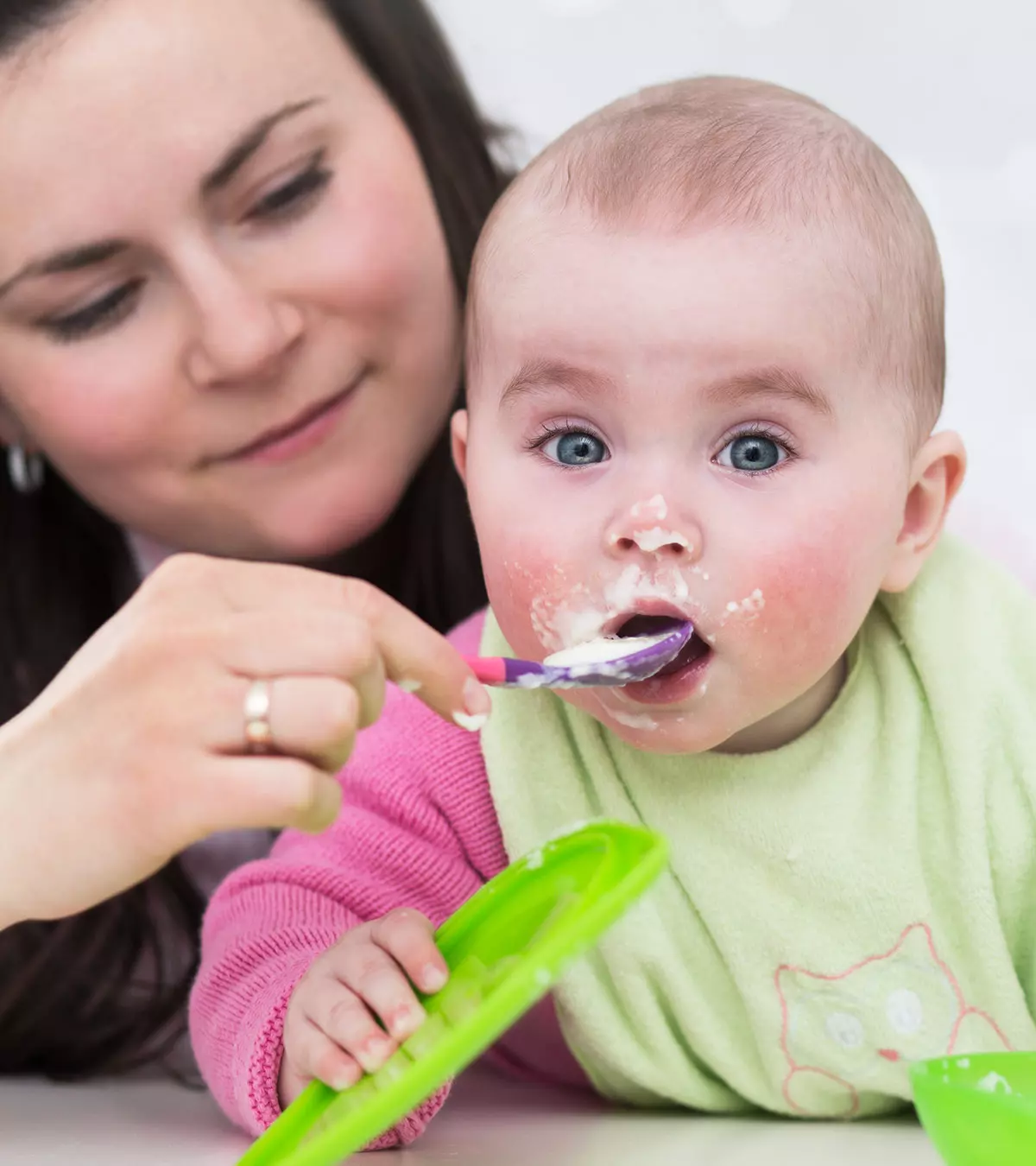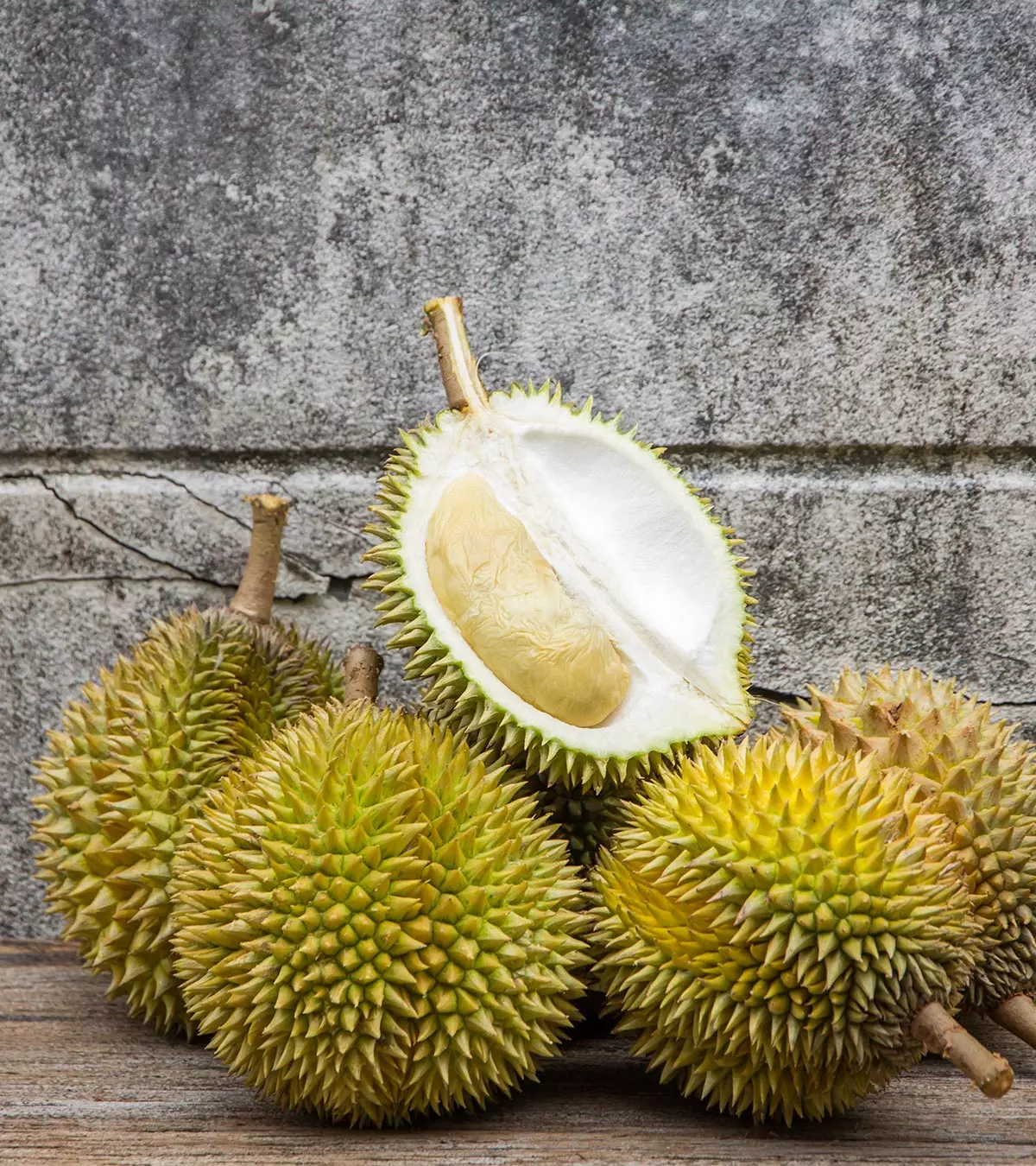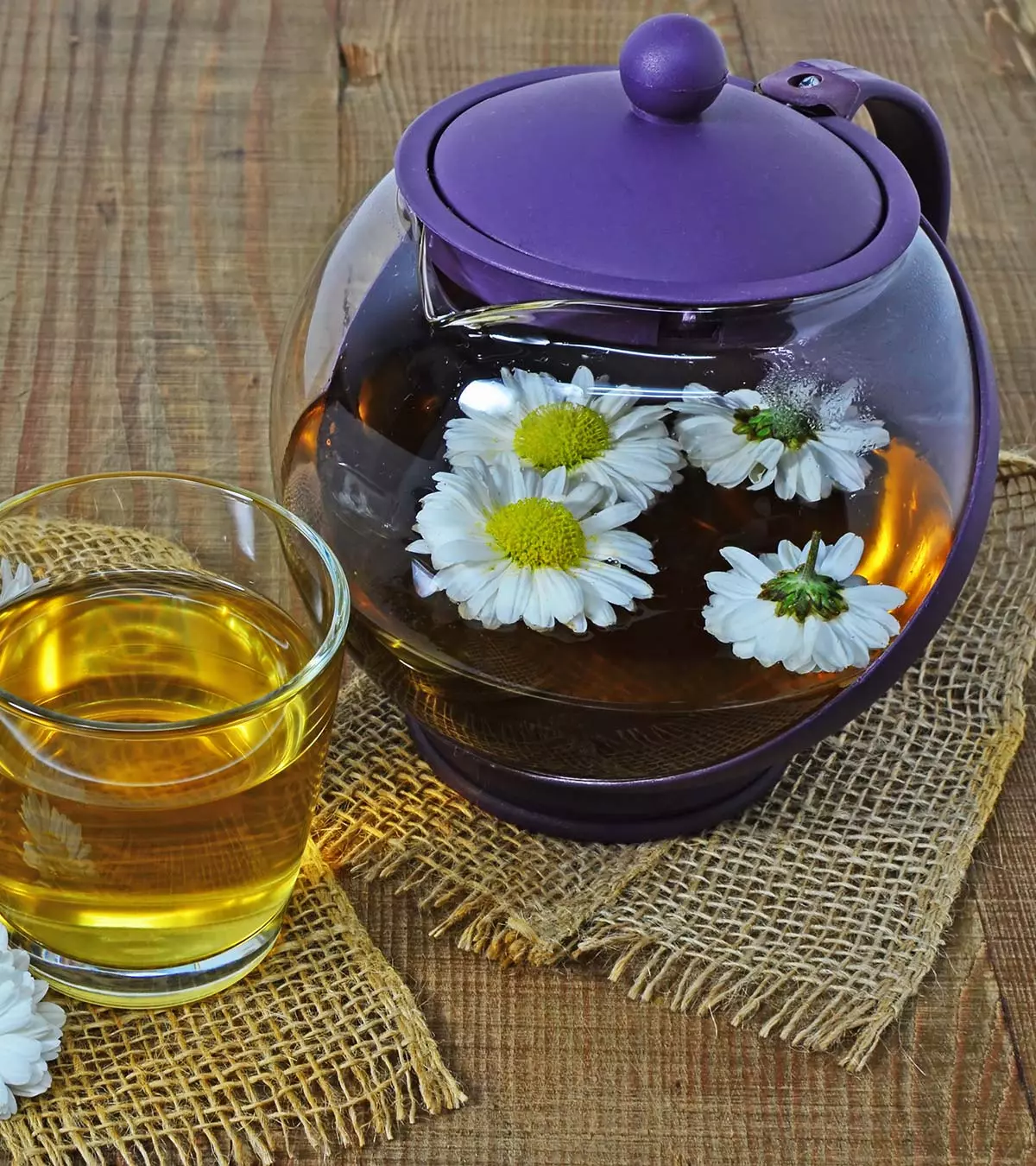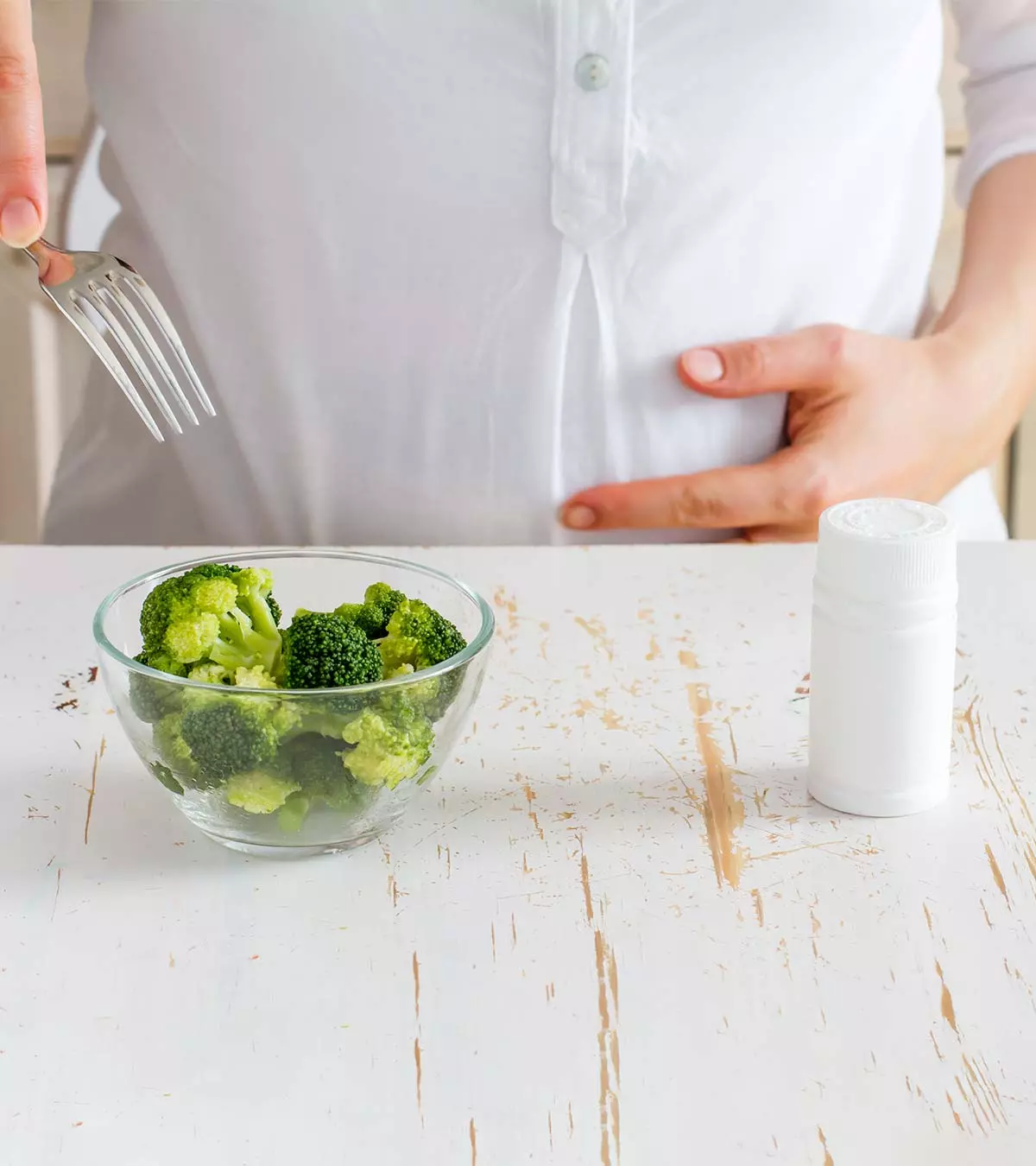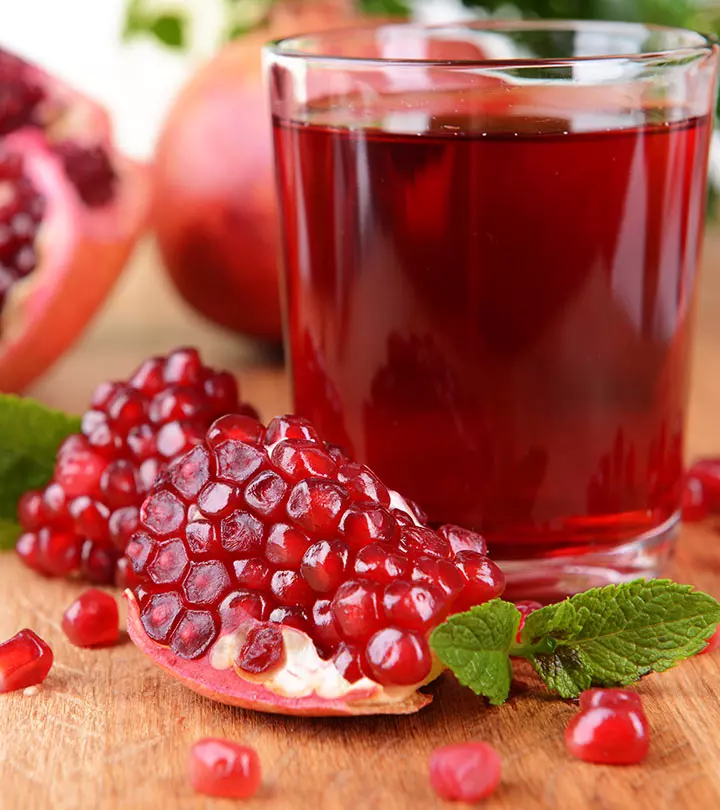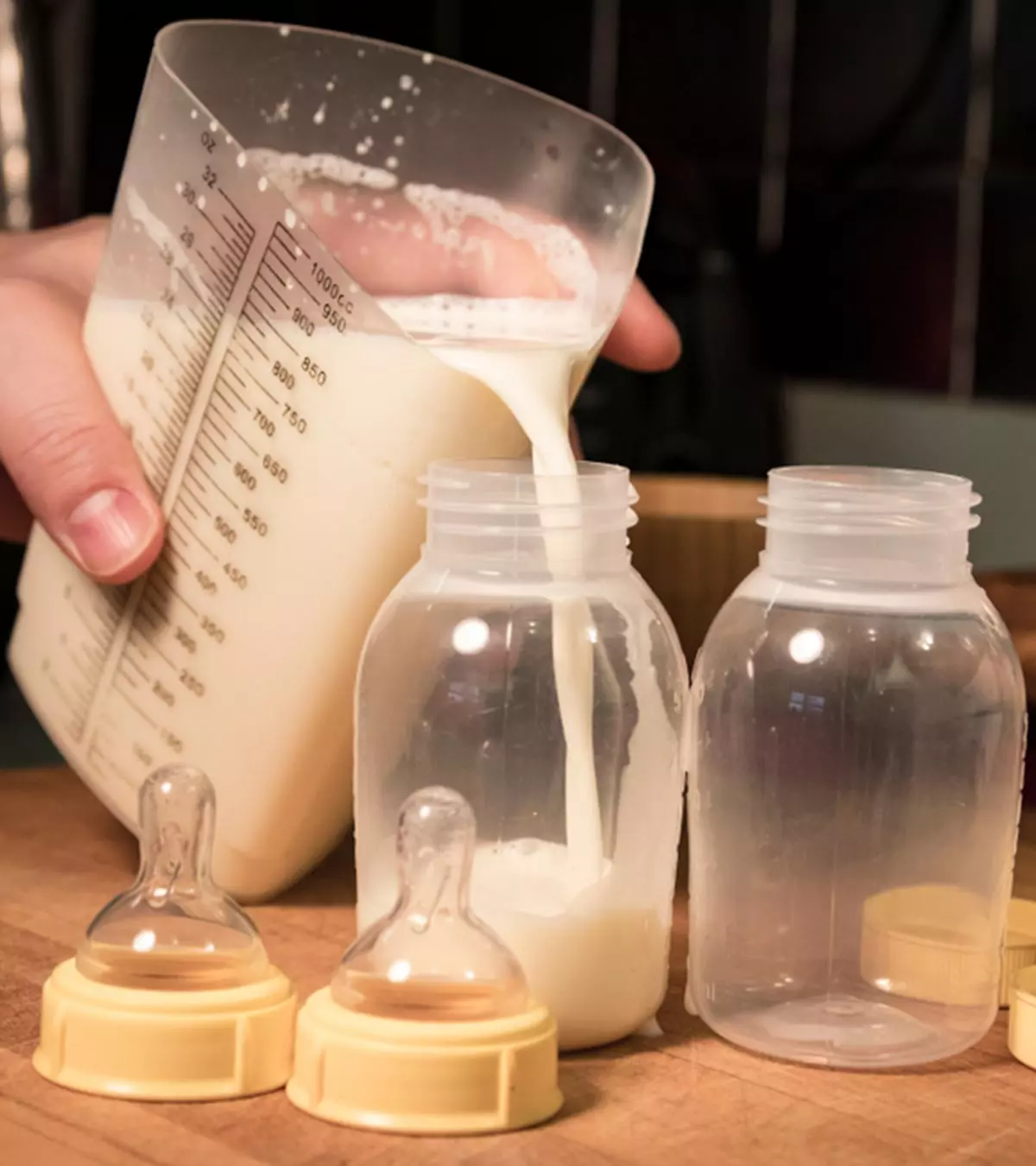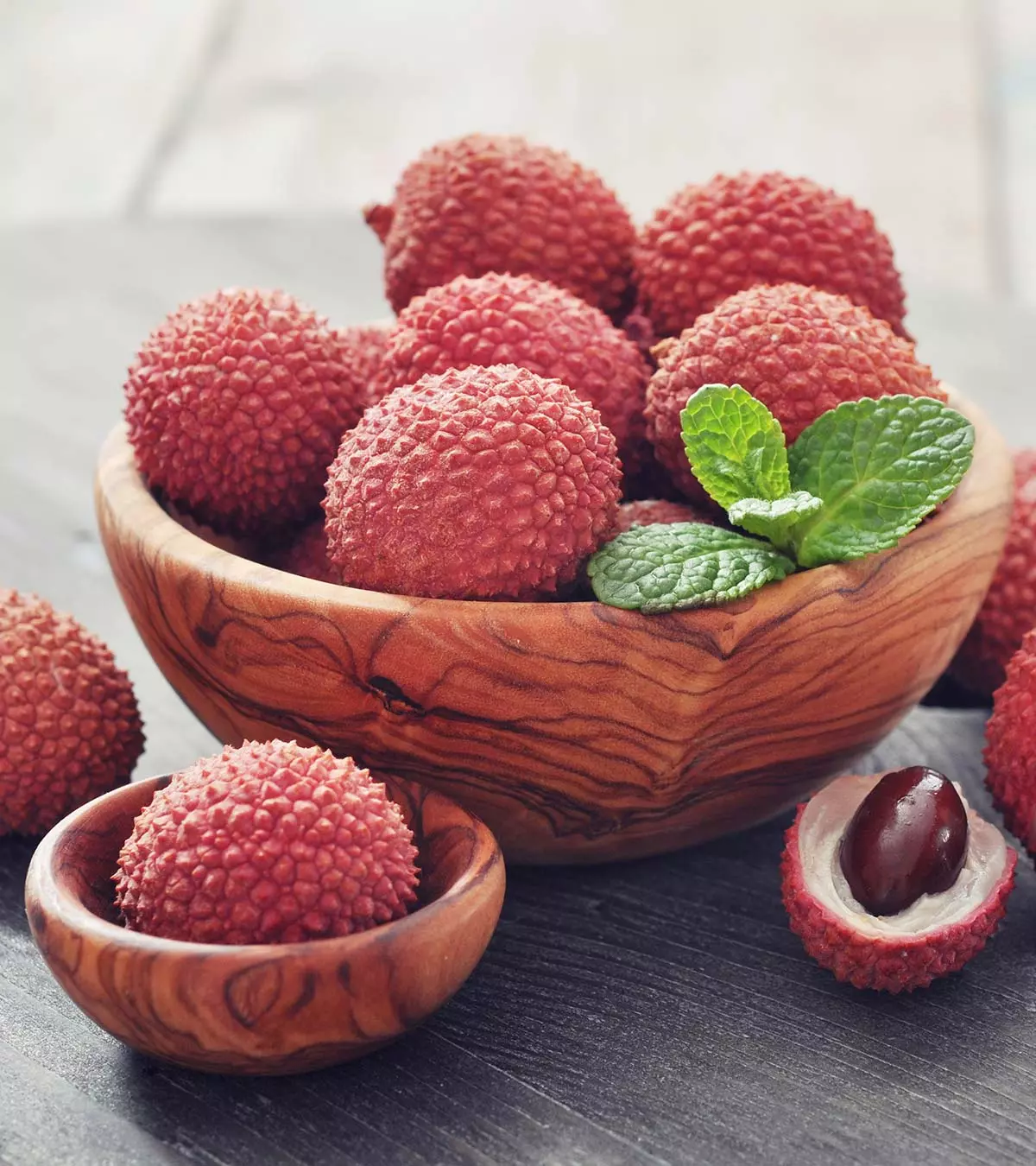
Image: Shutterstock
Litchi is a tropical fruit with a fleshy pulp and distinctive flavor and fragrance. In addition, it has a pleasantly sweet taste that may make several pregnant women crave litchi during pregnancy.

However, litchi is rich in fructose (a natural sugar in fruits), which can add extra calories to your total calorie intake. Moreover, it can cause glucose spikes if consumed in excess. Hence, knowing how much litchi one should eat during pregnancy is vital to reap its benefits fully.
Read on as we tell you all you need to know about consuming litchi when pregnant, including its possible health benefits and side effects.
Key Pointers
- Eating good quality litchi in moderation during pregnancy is considered safe.
- Litchis contain high levels of vitamin C, potassium, fiber, antioxidants, and phenolic substances.
- Litchi helps enhance the immune system, control fluid levels, ease digestion, manage weight, and prevent liver damage in pregnant women.
- Eating too much litchi while pregnant may result in a sore throat, mouth ulcers, gestational diabetes, low blood pressure, and medication side effects.
Is It Safe To Eat Litchi During Pregnancy?
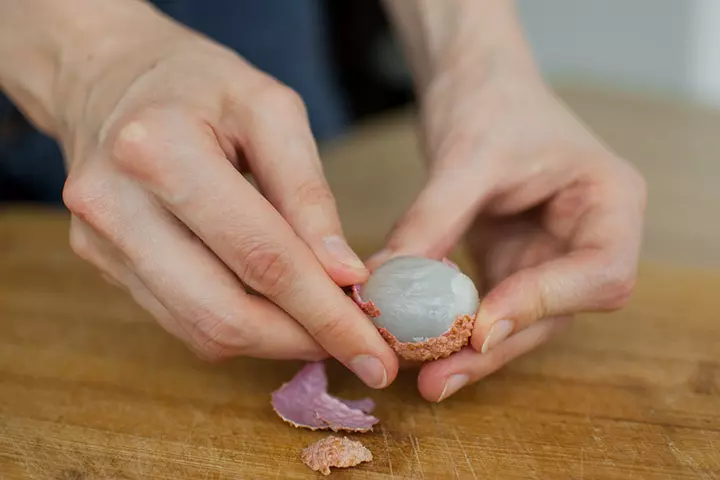
It is safe to eat litchi in moderation. The fruit contains vitamin C, potassium, and antioxidants, which can add to your daily intake of these nutrients for much-needed prenatal nutrition.
But consult your doctor before adding them to your diet because having them in excess can affect your pregnancy.
Benefits Of Eating Litchi During Pregnancy

By including litchis in your diet, you can meet your daily recommended values of essential nutrients for maternal health.
1. Vitamin C
Litchis contain high levels of vitamin C, which helps improve the immune system (1).
2. Potassium
Potassium is helpful in regulating fluid levels in the body system, therefore, controling heartbeat and blood pressure (2).
3. Fiber
Litchis are rich in dietary fiber, which eases digestion, prevents constipation and improves bowel movements (2).
4. Antioxidants
The fruit contains a good amount of antioxidants, which play a crucial role in fighting free radicals and preventing oxidative damageiAn unbalanced ratio of antioxidants to free radicals in the body leading to cell damage (2).
 Did you know?
Did you know?5. Polyphenols
Litchis contain a significant amount of phenolic compoundsiAntioxidant compounds naturally and widely found in foods derived from plants and animals , which help in managing weight gain and treating liver damage (2).
They also work against type 2 diabetes.
Keep reading to know about the nutrition value of litchis in detail.
Nutritional Value Of Litchi
According to the USDA, the nutrition present in 100g of raw litchi fruit is as follows (3):
| Nutrient | Amount |
|---|---|
| Water | 81.76g |
| Calories | 66kcal |
| Carbohydrates | 16.53g |
| Protein | 0.83g |
| Fiber | 1.3g |
| Fat | 0.44g |
| Sugars | 15.23g |
| Vitamins | |
| Vitamin C | 71.5mg |
| Thiamine (Vitamin B1) | 0.011mg |
| Riboflavin (Vitamin B2) | 0.065mg |
| Niacin (Vitamin B3) | 0.603mg |
| Folate (Vitamin B9) | 14mcg |
| Vitamin E (alpha-tocopherol) | 0.07mg |
| Electrolytes | |
| Potassium | 171mg |
| Sodium | 1mg |
| Minerals | |
| Calcium | 5mg |
| Iron | 0.31mg |
| Magnesium | 10mg |
| Zinc | 0.07mg |
| Phosphorus | 31mg |
g=grams; mg=milligrams; mcg=micrograms; IU=international unit
Although nutritious, litchis can be bad for you when taken in excess amounts.
What Are The Possible Side Effects Of Litchi In Pregnancy?

Be mindful of the quantity of litchis in your diet, for over-consumption of the fruit can cause the following complications.
- Generates internal heat, which harms you and impacts fetal development (4). It is known to cause an imbalance in the body, giving rise to some conditions such as a sore throat, bleeding nose, mouth ulcers and more.
- The excess sugar in the fruit will cause a sudden surge in blood sugar levels, increasing the risk of gestational diabetes and worsening the condition if you already have it. Studies also suggest that litchis can work at dropping the blood sugar levels when taken in the right quantities (5).
- Overeating litchis can lower your blood pressure to dangerous levels, causing conditions such as blurred vision, dizziness, cold, nausea, shallow breathing and extreme tiredness.
- Litchi can increase the risk of bleeding when they interact with drugs such as aspirin, anticoagulantsiA substance or drug that prevents the clotting of blood and reduces the risk of heart attacks and strokes (heparin or warfarin), antiplateletiA class of medications that prevent blood cells from combining to form blood clots medications (clopidogrel) and NSAIDs (naproxen or ibuprofen).
- Litchi can also cause hemorrhageiSevere bleeding resulting from a damaged blood vessel when taken with herbs and supplements such as Ginkgo Biloba, saw palmetto, or garlic during pregnancy (6).
These risks can be mitigated by carefully selecting quality litchis and storing them the right way.
How To Choose And Store Litchis?
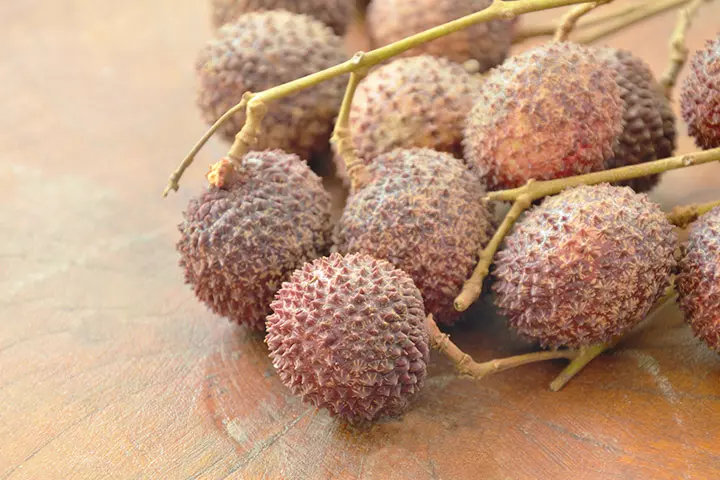
The best litchis are those that are firm, reasonably hard, feel heavy and have a pinkish-brown dry shell. Do not choose the ones which are soft to hold, have black or cracked spots. Also, it is best to choose fresh litchis from nearby organic farms or buy from reputable sources.
Litchis do not have an extended shelf life and need to be refrigerated for later use. Put them in a plastic bag and refrigerate to keep them fresh for a couple of weeks at most. The best way to benefit from litchis is to consume them fresh, without refrigerating them for long.
 Quick tip
Quick tipHow To Consume Litchis?
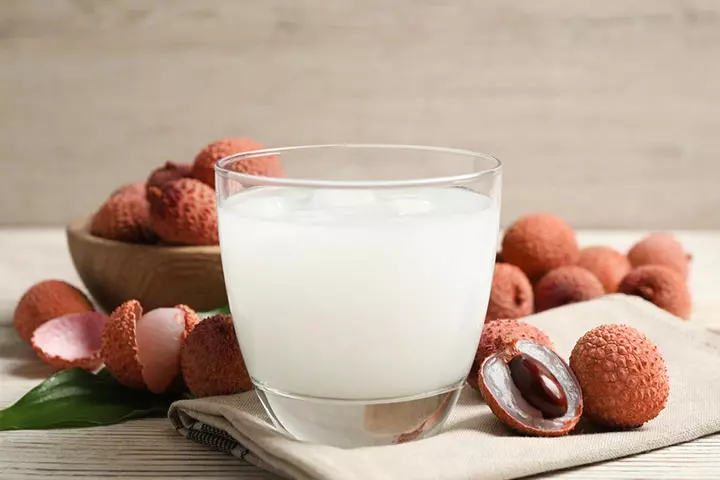
Here is how you can enjoy this flavorful fruit by ensuring food safety.
- Eat it whole by removing the skin and the seed.
- Add to a pudding or make smoothies.
- Add them to salad, cereal or yogurt.
- Make fresh juices or mocktails in combination with other fruits to satisfy your cravings.
- Make a spread or topping along with other fruits.
- Add them to desserts or serve on a cheese platter.
- Peel and deseed litchis, then freeze them for a cool treat.
- Pair them with vanilla or coconut ice cream for a tropical dessert.
 Quick tip
Quick tipKeep reading for more about eating litchis when you are pregnant.
Frequently Asked Questions
1. Can I drink litchi juice while pregnant?
Yes, you can drink litchi juice during pregnancy. But choose fresh litchi juice over canned ones to avoid excess sugars.
2. Can eating litchi increase the risk of gestational diabetes?
Over-consumption of litchi can increase the risk of gestational diabetes as this fruit falls under high glycemic index (GI) foods. High GI foods break down quickly after intake, raising the blood sugar levels (7).
3. What happens if you eat a litchi seed during pregnancy?
Litchi seeds are not known to have any effects on pregnancy or the fetus, so eating them may not be harmful in any way. In fact, it could be beneficial since the extract from the seeds is known to possess antiviral and antioxidant properties (8).
4. Is there a recommended amount of litchi safe for pregnant women to consume?
The recommended daily intake of litchis is around 8. However, this amount may vary based on your trimester-specific calorie needs (10).
5. Can litchi help reduce pregnancy symptoms such as morning sickness or fatigue?
6. Can litchi cause miscarriage?
There is no evidence that consumption of litchee can lead to miscarriage.
7. Can I have litchi during the first trimester?
Yes, you may have litchis during the first trimester. If you have diabetes, do manage your blood sugar appropriately to prevent litchi consumption from causing a sudden spike in blood sugar, which may affect the pregnancy (10).
Consuming litchi during pregnancy is considered safe for women as they are a rich source of iron and several essential vitamins. However, too much of anything is not good. So it is advised that you should have it in moderation to enjoy all its benefits. There are various ways to include litchi in your diet–eat it raw, make a smoothie, or add it to other desserts with fruits. Consult your doctor immediately if you sense any signs of allergy or irritation after consuming litchi.
Infographic: Pros And Cons Of Eating Litchi While Pregnant
Loaded with vitamin C, Litchi is a delicious pulpy tropical fruit and a perfect combination for the summer season. You can even enjoy this wonderful fruit when you’re pregnant. However, be careful and do not overeat. We bring you the infographic below to learn the health benefits and risks of eating litchi during pregnancy. Illustration: Momjunction Design Team
Illustration: Is It Safe To Eat Litchi During Pregnancy?

Image: Dall·E/MomJunction Design Team
References
- Tropical Fruits.
https://hort.purdue.edu/newcrop/proceedings1990/V1-337.html - What are the health benefits of Lychee (Litchi) fruit?
https://www.researchgate.net/post/What_are_the_health_benefits_of_Lychee_Litchi_fruit - Litchis, raw.
https://fdc.nal.usda.gov/fdc-app.html#/food-details/169086/nutrients - Yang Zhou et al.; (2012); Effects of Litchi chinensis fruit isolates on prostaglandin E2 and nitric oxide production in J774 murine macrophage cells.
https://www.ncbi.nlm.nih.gov/pmc/articles/PMC3307436/ - E. K. Kilari et al.; (2015); Effect of aqueous pericarp extract of Litchi chinensis on hypoglycemic and antihyperglycemic activities in normal and in streptozotocin induced diabetic rats.
https://www.semanticscholar.org/paper/Effect-of-aqueous-pericarp-extract-of-Litchi-on-and-Kilari-Koratana/a38a0f469b057ec07661cc7f62c2083c942b8226#paper-header - Eswar Kumar Kilari and Swathi Putta; (2016); Biological and Phytopharmacological Descriptions of Litchi Chinensis.
https://www.ncbi.nlm.nih.gov/pmc/articles/PMC4791990/ - Wu-Qing Huang et al.; (2017); Excessive fruit consumption during the second trimester is associated with increased likelihood of gestational diabetes mellitus: a prospective study.
https://www.ncbi.nlm.nih.gov/pmc/articles/PMC5341573/ - H. Wang et al.; (2008); Antiviral effect in vitro of extract from seed of Litchi chinensis Sonn and preliminary study on its antiviral mode.
https://www.researchgate.net/publication/287068568_Antiviral_effect_in_vitro_of_extract_from_seed_of_Litchi_chinensis_Sonn_and_preliminary_study_on_its_antiviral_mode - Pierre Brat et al.; (2009); Daily polyphenol intake in France from fruit and vegetables.
https://pubmed.ncbi.nlm.nih.gov/16920856/ - Litchi During Pregnancy: To Eat or Not To Eat; Sitaram Bhartia Blog
https://www.sitarambhartia.org/blog/maternity/litchi-during-pregnancy/ - Lychee nutrition facts and analysis.
https://www.nutritionvalue.org/Lychee_63126510_nutritional_value.html - Vitamin B6 for Morning Sickness; Kaiser Permanente
https://healthy.kaiserpermanente.org/health-wellness/health-encyclopedia/he.vitamin-b6-for-morning-sickness.tn9126
Community Experiences
Join the conversation and become a part of our nurturing community! Share your stories, experiences, and insights to connect with fellow parents.
Read full bio of Dr. Shikha Sharma
Read full bio of Swati Patwal
Read full bio of Rebecca Malachi
Read full bio of Reshmi Das





